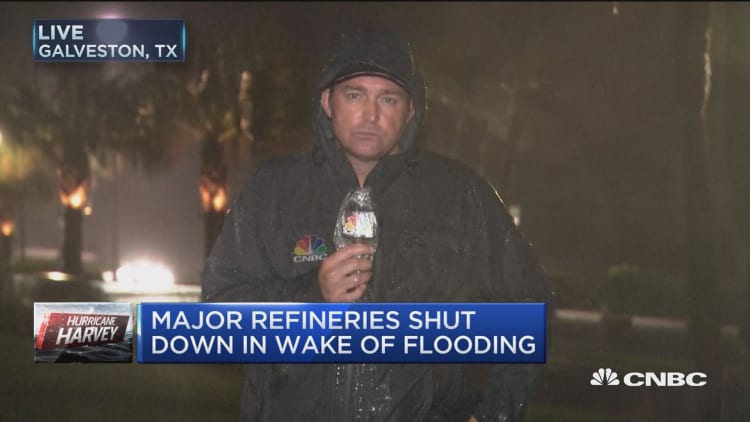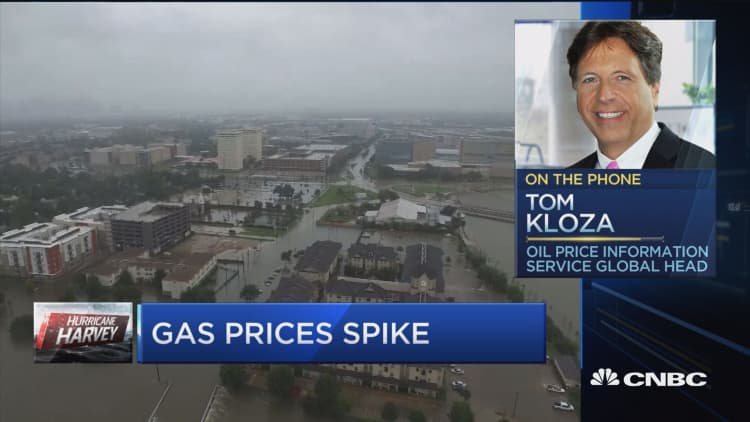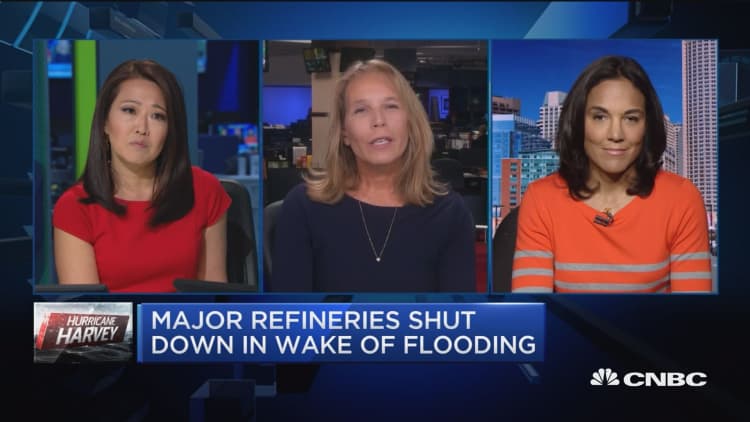
Refineries in some parts of Texas slammed by Tropical Storm Harvey were aiming to start back up this week, but Houston plants were producing very few products and large facilities further east were bracing for heavy rainfall and potential flooding.
Oil market analysts projected that about 13 to 16 percent of the country's capacity to refine crude oil into gasoline, diesel and other fuels was offline Tuesday. There were few reports of serious damage to refineries on Tuesday, but flooding and continued rain in Houston made it unclear when workers would be able to reach facilities.
Parts of South Texas and Louisiana remain under water or on flood watch as the Gulf Coast prepares to absorb more rain in the coming days.
NOAA Weather Forecast
Refiners Valero and Citgo are preparing to restart operations in the next few days at facilities in Corpus Christi, Texas, near where Harvey made landfall overnight on Friday as a Category 4 Hurricane.
However, analysts said weather conditions and flooding in Houston and Galveston, Texas, would keep many refiners in the area out of commission through much of the week. The region is capable of refining about 2.7 million barrels a day of crude oil, or about 14 percent of total U.S. capacity.
"They're making a very minimal amount of petroleum products if any at all. They can't get crude in, and the pipelines out are mostly shut," said Andy Lipow, president of Lipow Oil Associates.
Lipow estimates that Harvey has affected as much as 3 million barrels per day of refining capacity, or 27 percent of the U.S. total, taking into account refineries that have not shut down entirely, but throttled back operations.
Colonial Pipeline, which transports fuel from the Gulf Coast to the southeast and further north, was operating at reduced capacity due to supply disruptions from Houston area refiners. Colonial also reported storm-related damage at its Pasadena, Houston and Cedar Bayou facilities.

Just up the coast from Houston, the four refineries in the Beaumont and Port Arthur area in Texas appear poised to close, Lipow said. The area is home to about 8.5 percent of total U.S. refining capacity.
Exxon Mobil is closing its Beaumont refinery, Reuters reported Tuesday. Motiva's 600,000 barrel a day refinery in Port Arthur, the largest in the United States, was operating at 60 percent of capacity.
Lake Charles, Louisiana, is next in the storm's path, but the area should not see the devastation that Harvey brought to Houston, said Jacob Meisel, chief weather analyst at Bespoke Weather Service.
"I would expect any refinery shutdowns across eastern Louisiana to be rather brief as impacts should not be as long lasting," said told CNBC in an email.
It remains uncertain how long refineries will operate below normal levels.
It took one to two months for refineries to return to normal production after Hurricane Katrina knocked out about 30 percent of U.S. refining capacity when it struck the Gulf Coast in 2005, according to Tamar Essner, director of energy and utilities at Nasdaq Corporate Solutions.
Impact at the pump

The effect on gasoline prices for much of the nation is also a moving target at this point.
Oil Price Information Service reported that prices for gasoline that moves through the Colonial Pipeline had reached a new 2017 high of roughly $1.76 per gallon.
U.S. gasoline traded at the New York Mercantile Exchange has risen 8 percent to $1.7484 since Thursday.
Lipow said the ultimate impact on drivers would be an additional 10 to 15 cents at the pump, primarily east of the Rockies. He said he was monitoring developments over the next 24 hours to determine whether prices could rise further.
U.S. oil prices have slumped more than 4 percent since Thursday. Refinery shutdowns mean there is lower demand for crude.



